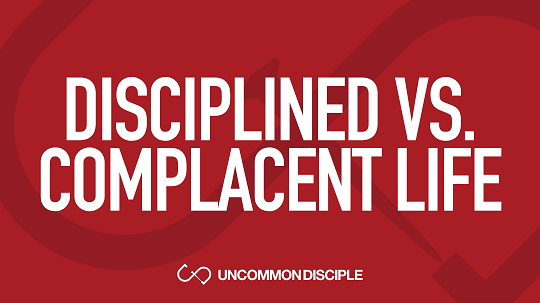
Discipline vs. Complacency
by Mark Nigro
Episode One
In episode one of our Uncommon Disciple podcast we compare and contrast complacency and discipline. On the one hand, complacency is often thought of as a passivity that comes from lazy contentment with the status quo. On the other hand, discipline is typically perceived as either something external that a parent failed to provide when a child disobeyed or as a lifestyle regimen that is taught in the military. While neither is exclusively correct, complacency and discipline do have connotations of each.
When we speak of complacency in contrast to discipline, we refer not to laziness but to the harmful effects that come from unwarranted satisfaction with oneself or one’s achievements to such an extent that further growth is stunted and new opportunities are missed. Imagine a complacent athlete. She stops giving her all in training. She stops pursuing future victory. She no longer desires to be all that she can be. In this sense, complacency is the enemy of better and certainly is not the friend of an uncommon disciple because an eternal legacy is not built in the status quo but in a life that continues pushing upwards to be all that God has called us to be. Always.
Discipline, when understood and applied as we intend it, is neither an external effect delivered by a parent nor a regimen enforced by high ranking officers. It is an appreciation for potential, a sense of responsibility and a hunger for better. The one whose view of life is filtered through the lens of discipline sees the eternal value of time so that it is not squandered. It finds tremendous freedom through the benefits of structure. There is a pursuit of personal growth because potential as given by God is never fully exhausted. And finally, opportunities are seen as God entrusting more to the faithful steward. A disciplined life then, cannot be complacent because it is not satisfied with the status quo. It pursues a better use of time and therefore manages it with care because time lost cannot be regained.
Uncommon disciples seek to use time well and cultivate the habits that support and use discipline to maximize time and resources. After all, we are stewards of what God has entrusted to use, not the owners of it. And one day will give an account. In a sense, the parable of the talents is for each of us in that life is not ours to spend on ourselves but a precious gift to be used for God’s glory, His purposes, and to our greatest potential (Matthew 25:14-30). And by definition this side of eternity, life is short. Only in God’s wisdom and with his direction can we, through the absence of complacency and the benefits of a disciplined life, make the most of it. And while discipline is not very commonly found today in the lives of people, it can be found in yours and mine if we choose to be uncommon. Discipline can be learned. It can be cultivated. It can be used to benefit us in ways God has always intended by His grace but we may have never imagined. What’s your take on all this? Let us know in the comments.
